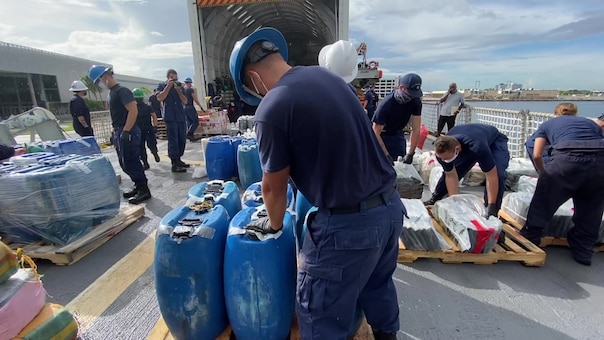VIDEO AVAILABLE: Coast Guard Cutter Escanaba crew returns home to Boston after 65 day counter-narcotics patrol
U.S. Coast Guard sent this bulletin at 10/20/2020 01:50 PM EDT
| News Release |
U.S. Coast Guard 1st District Northeast |
VIDEO AVAILABLE: Coast Guard Cutter Escanaba crew returns home to Boston after 65 day counter-narcotics patrol
 |
 |
Editors' Note: Click on images to download high resolution version.
BOSTON - The crew of Coast Guard Cutter Escanaba (WMEC 907), returned home to Boston, Tuesday, following a 65-day counter-narcotics patrol in the Eastern Pacific Ocean.
The crew supported Operation Martillo, a presidential initiative designed to disrupt transnational criminal organizations in Central and South America.
Escanaba’s crew deployed with an embarked Helicopter Interdiction Tactical Squadron crew (HITRON) based out of Jacksonville, Florida, who augmented the cutter’s organic law enforcement teams, with aerial use of force capabilities.
Following their arrival in the Pacific, Escanaba’s crew coordinated with a U.S. Customs and Border Protection maritime patrol aircraft crew, and a U.S. Navy HH-60 helicopter crew embarked on the USS Pinckney, to interdict a vessel smuggling more than 3,000 pounds of suspected narcotics.
The 270-foot Escanaba’s 100-person crew remained busy throughout their patrol, interdicting five vessels and detaining 15 suspected narcotics traffickers attempting to smuggle more than 1,700 pounds of cocaine, almost 500 gallons of liquid cocaine and approximately 6,500 pounds of marijuana with a total estimated street value of more than $58 million.
“I am extremely proud of our results on this patrol,” said Cmdr. Mike Nalli, Escanaba’s commanding officer. “We capitalized on the extraordinary teamwork between JIATF-S and our partner nations to make five high-quality interdictions and apply pressure to the transnational criminal organizations in the region.”
In addition to law enforcement operations, Escanaba’s crew participated in a training event with the Costa Rican Coast Guard. The exercise focused on tactics, communications, and best practices for combatting transnational criminal organizations in Central and South America, and strengthened a vital partnership in the region. Partner nations, such as Costa Rica, are involved in almost 70% of drug disruptions, a capability built through years of security cooperation.
On April 1, U.S. Southern Command began enhanced counter-narcotics operations in the Western Hemisphere to disrupt the flow of drugs in support of Presidential National Security Objectives. Numerous U.S. agencies from the Departments of Defense, Justice, and Homeland Security cooperate in the effort to combat transnational organized crime. The Coast Guard, Navy, Customs and Border Protection, FBI, Drug Enforcement Administration, and Immigration and Customs Enforcement, along with allied and international partner agencies, play a role in counter-drug operations.
The fight against drug cartels in the Eastern Pacific Ocean requires unity of effort in all phases from detection, monitoring and interdictions, to criminal prosecutions by international partners and U.S. Attorneys’ Offices in districts across the nation. The law enforcement phase of counter-smuggling operations in the Eastern Pacific Ocean is conducted under the authority of the 11th Coast Guard District, headquartered in Alameda. The interdictions, including the actual boardings, are led and conducted by members of the U.S. Coast Guard.
Known as "The Pride of Boston," the Escanaba is a medium-endurance cutter homeported in Boston.
-USCG-

